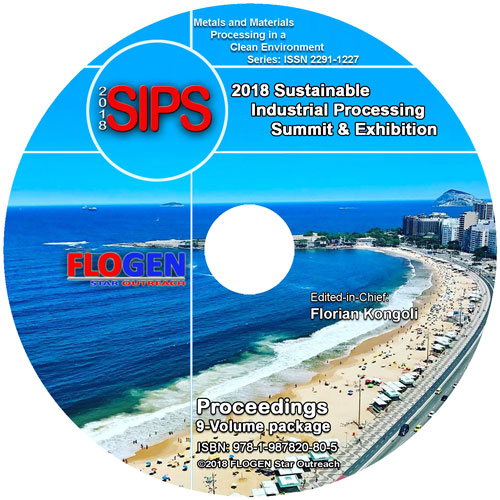2018-Sustainable Industrial Processing Summit
SIPS2018 Volume 9. Energy Production, Secondary Battery
| Editors: | F. Kongoli, H. Dodds, M. Mauntz, T. Turna, V. Kumar, K. Aifantis |
| Publisher: | Flogen Star OUTREACH |
| Publication date: | 23 December 2018 |
| Pages: | 170 pages |
| ISBN: | 978-1-987820-98-0 |
| ISSN: | 2291-1227 (Metals and Materials Processing in a Clean Environment Series) |

CD shopping page
Lead-acid Battery Recycling - A Different Way
Athan Fox1; Miles Freeman1; Robert Liu1; Johdie Harris1; Vasant Kumar2;1AURELIUS ENVIRONMENTAL, Dudley, United Kingdom; 2UNIVERSITY OF CAMBRIDGE, Cambridge, United Kingdom ;
Type of Paper: Keynote
Id Paper: 426
Topic: 14
Abstract:
The lead-acid battery (LAB) market is forecast to reach $84 billion USD by 2025.<sup>1</sup> Despite intense competition from alternative and emerging energy storage solutions, LABs continue to deliver the most proven, low-cost, safe and affordable option for electrical energy storage. Indeed, LABs are used widely in automobiles (for starting, lighting and ignition), traction and heavy industry (for example electric forklifts and trucks), telecommunications, emergency lighting, renewable energy systems, medical equipment, railway backup systems, oil and gas exploration, and more.<br /><br />The recycling of LABs via current methods is energy intensive and wasteful. In some parts of the world it produces "smelter smoke", a toxic mixture of sulphur dioxide, nitrogen dioxide and very often lead metal particles. For this reason, although LABs are the world's most successfully recycled commodity product,<sup>2</sup> and a perfect example of a successful multi-million tonne circular economy, the incumbent recycling processes are in dire need of improvement and technological innovation.<br /><br />At Aurelius, our aim is to revolutionise the art of recycling through science, ethical practice, sustainability and technology. Our vision is a web of industries, where one stream's waste is another stream's feed-stock: bridging linear and wasteful processes to create circular, energy efficient, non-polluting, zero waste industries. Our stepping stone towards this vision is a technology for the recycling of LAB paste.<br /><br />Invented in 2006 by Professor Vasant Kumar at the University of Cambridge,<sup>3-5</sup> UK, the technology was licensed exclusively in 2016 to Aurelius for further development, scaling up and commercialisation. Our piloting efforts are funded by two Innovate UK awards and a Horizon 2020 (Phase 2) SME grant. To date, we have raised more than 2 million USD in grant funding, while our annual turnover from the collection, dismantling and processing of more than 10,000 tonnes of LAB scrap per year is also used to fund our technology and innovation.<br /><br />The patented hydrometallurgical process, branded as Fenix<sup>Pb</sup>, brings about a critical improvement to the lead recycling industry.<sup>6</sup> It enables conversion of spent battery paste to leady oxide (Pb/PbO) without producing or handling an intermediate ingot, and without utilising electrowinning. In fact, our process reduces the carbon footprint by 80-89%; eliminates noxious gases (including sulphur dioxide) at no added cost; reduces slag by more than 90%; and produces energy (this is because a key stage in the process is highly exothermic, releasing rather than consuming energy).<br /><br />Our leady oxide is also a step-change in lead-acid battery technology. Laboratory tests carried out at the University of Cambridge have shown that batteries produced from our leady oxide have a 30% improved energy density. This innovation is largely due to the particle size; indeed, our advanced leady oxide is a nano-crystalline solid. Moreover, our process delivers a scalable means of controlling accurately the free metallic lead content (%Pb) and ratio between the alpha and beta phases of the oxide - enabling battery manufacturers to fine-tune their batteries' active materials dependant on its properties and applications.